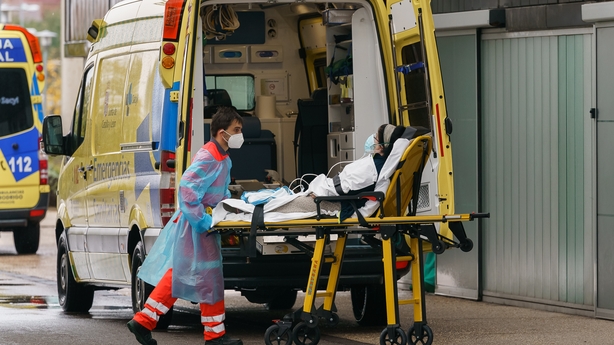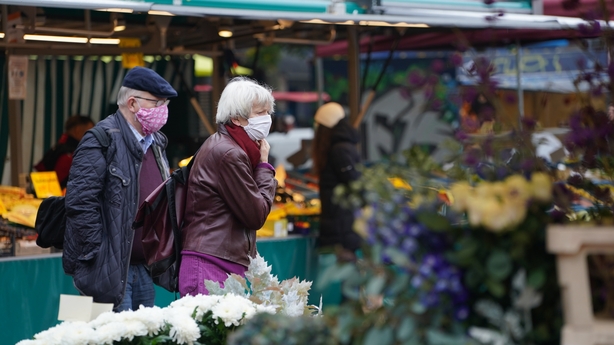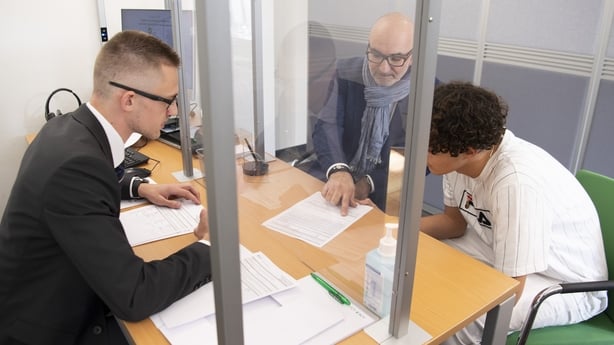The French government is extending a 9pm to 6am curfew to more than 38 regional departments from midnight tomorrow, impacting 46 million of its 67 million population.
French Prime Minister Jean Castex said the action was necessary due to the rapid spread of coronavirus and would include some overseas French territories.
It follows a record 40,000 new virus cases announced in France over the past 24 hours.
Authorities had already imposed a curfew in Paris and eight other big cities last week.
Some businesses have adapted their opening hours as a result, with one cinema in Paris offering breakfast to customers at 8am to encourage people to go and see a movie at an earlier time.
"A second wave of the coronavirus epidemic is now under way in France and Europe. The situation is very serious," Mr Castex said at a news conference, adding that the month of November would be very tough.
"The coming weeks will be hard and the number of deaths will continue to rise," he said.
He said the curfew would take effect from Friday at midnight and remain in place for six weeks, adding that the situation would be evaluated next week and that curfew rules might be tightened if necessary.
France has reported more a seven-day average of more than 20,000 new cases over the past six days and the total number of confirmed infections is now over 957,000.
More than 34,000 people have died from the disease.
Spain set for drastic measures
Spain's health minister said that the country's coronavirus pandemic was not under control and that drastic measures were needed to combat it.
Salvador Illa said his administration was discussing more restrictions on mobility with regional authorities, and that he expected the pandemic to make life tough for the next five or six months.
Yesterday, Spain became the first country in Western Europe to surpass the one-million-case threshold.
The novel coronavirus has killed at least 1,126,000 people since emerging in China late last year, according to a tally from official sources compiled by AFP.
Global GDP is expected to contract 4.4 percent in 2020, the International Monetary Fund said.
Ireland has entered Level 5 restrictions for six weeks, which sees non-essential business shut and people asked to stay at home.
Spain announced 16,973 cases yesterday, taking it to more than a million since its first diagnosis on 31 January, in the Canary Islands.

Spain, home to around 47 million people, is only the sixth country worldwide to cross the million mark after the United States, India, Brazil, Russia and Argentina, according to the AFP tally.
Meanwhile Britain, with Europe's largest death toll of 44,000, said more than a million people in the north would be banned from mixing with other households, prompting Labour leader Keir Starmer to warn of "months of agony" ahead.
The county of South Yorkshire, which includes the city of Sheffield, will enter into "very high" alert or tier three restrictions for at least four weeks from Saturday, the UK government announced.
The decision will affect around 1.4 million people, taking the number under the very toughest restrictions to 7.3 million - or 13% of England's population.
Elsewhere in Europe, Poland's prime minister said he wanted "red zone" lockdown measures to be extended to the entire country amid a record spike in infections.
And the Czech government said it would curb movement and close shops and services to battle a huge spike in cases.
The latest European Centre for Disease Control and Prevention data showed the country had by far the most new cases and deaths per 100,000 inhabitants over the past two weeks.
Germany's virus situation 'very serious': health body
Germany is facing a "very serious" rise in coronavirus cases, the head of the Robert Koch Institute disease control centre said, as the country reported a record 11,287 new infections.
It is still possible to bring the virus under control through "systematic compliance with restrictive measures", Dr Lothar Wieler said.
But "the overall situation has become very serious," he added.
Authorities have toughened measures to curb the spread of the pandemic, such as banning large gatherings.
Local restrictions have also been imposed - in Berlin, it is now compulsory to wear a mask on certain busy streets.

In a symbol of Germany's woes, Health Minister Jens Spahn - a chief ally of Chancellor Angela Merkel who has been praised for his calm stewardship during the pandemic - tested positive and went into home isolation.
Dr Wieler blamed private gatherings, especially among young people, for the dramatic rise in cases.
"The more people gather in private circles, the more the numbers will increase and the further the virus will spread," he said, noting that "the young are currently the most exposed to this virus".
He urged people to observe the rules but cautioned that an "uncontrolled" spread could be unavoidable in some regions.
On Saturday, Chancellor Merkel asked citizens to cut down on socialising, encouraging them to stay at home instead.
"What winter will be, what our Christmas will be, will be decided in the days and weeks to come," she warned.
At least 392,049 people have been infected in Germany since the outbreak of the virus, with 9,905 deaths reported.
Swiss sound the alarm as virus cases double
Switzerland's president said it was time for action on the country's skyrocketing coronavirus cases, which are now doubling from week to week.
If the situation does not stabilise within days, the government is threatening to impose new measures to control the surge in registered infections, which began around the start of the month.
"If the curve does not flatten out by next Wednesday, we will really make decisions that go further," President Simonetta Sommaruga told national broadcaster RTS.
The southwest of the country has been particularly affected, with clusters breaking out in retirement homes.
"We were all hoping we could go into winter without this new increase in the number of cases," said Ms Sommaruga.
Despite acknowledging pandemic fatigue, she urged the public to take the initiative.

"We know how to protect ourselves with social distancing, masks and hygiene. If everyone participates, we will get there. It's a question of responsibility and solidarity."
Health Minister Alain Berset said yesterday that hospitalisations and deaths were tracking the rise in cases.
He said the government would look at measures affecting public places and gatherings of people.
On 2 June, Switzerland registered just three new cases.
But infections then started to rise - first slowly, then more rapidly during October with today's figures showing there were 5,230 new cases registered in the past 24 hours, in the country of 8.5 million people.
A total of 96,731 cases have been registered in Switzerland since the start of the pandemic, and 1,866 deaths.
Roche teams up with Atea in US on oral coronavirus treatment
Swiss pharmaceuticals giant Roche said it is collaborating with Atea Pharmaceuticals on the development of an orally administered drug to treat coronavirus patients who have not been hospitalised.
"Roche and Atea Pharmaceuticals are joining forces in the fight against Covid-19 to develop, manufacture and distribute AT-527, Atea's investigational oral direct-acting antiviral, to people around the globe," the two companies said in a joint statement.
AT-527 is currently being tested in phase 2 clinical trials for use as a treatment for people hospitalised with moderate cases of coronavirus.
And phase 3 trials - the last stage before an application can be made for a new drug to be approved and sold on the market - are to be held in the first quarter of 2021 where it will be tested on patients outside a hospital setting, Roche said.
"AT-527, while being a potential oral treatment option for hospitalised patients, also holds the potential to be the first oral treatment option for Covid-19 patients that are not hospitalised," the statement said.
"If successful, AT-527 could help treat patients early, reduce the progression of the infection, and contribute to decreasing the overall burden on health systems."
Under the terms of the agreement, the drug, if approved by the relevant authorities, will be distributed in the US by Atea and in the rest of the world by Roche.
Financial details of the deal were not disclosed.

